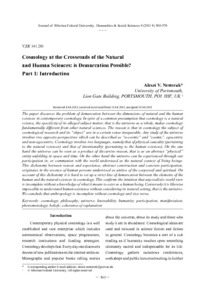Космология на перекрестке естественных и гуманитарных наук: возможна ли демаркация? Часть 1. Введение
Скачать файл:
URI (для ссылок/цитирований):
https://elib.sfu-kras.ru/handle/2311/2310Автор:
Нестерук, А.В.
Nesteruk, Alexei V.
Дата:
2011-04Аннотация:
The paper discusses the problem of demarcation between the dimensions of natural and the human
sciences in contemporary cosmology. In spite of a common presumption that cosmology is a natural
science, the specificity of its alleged subject matter, that is the universe as a whole, makes cosmology
fundamentally different from other natural sciences. The reason is that in cosmology the subject of
cosmological research and its object are in a certain sense inseparable. Any study of the universe
involves two opposite perspectives which can be described as a-cosmic and cosmic, egocentric
and non-egocentric. Cosmology involves two languages, namely that of physical causality (pertaining
to the natural sciences) and that of intentionality (pertaining to the human sciences). On the one
hand the universe can be seen as a product of discursive reason, that is as an abstract physical
entity unfolding in space and time. On the other hand the universe can be experienced through our
participation in, or communion with the world understood as the natural context of living beings.
This dichotomy between reason and experience, abstract construction and concrete participation,
originates in the essence of human persons understood as unities of the corporeal and spiritual. On
account of this dichotomy it is hard to set up a strict line of demarcation between the elements of the
human and the natural sciences in cosmology. This confirms the intuition that any realistic world view
is incomplete without a knowledge of what it means to exist as a human being. Conversely it is likewise
impossible to understand human existence without considering its natural setting, that is the universe.
We conclude that anthropology is incomplete without cosmology and vice versa. В статье обсуждается проблема демаркации элементов естественных и гуманитарных наук
в космологии, понимаемой как дисциплина, занимающаяся изучением вселенной как целого.
Акцент сделан на феноменологическом анализе предпосылок космологии, подчеркивающих
ее исторически случайный характер, связанный с положением человека в космосе. Одним
из тезисов является предложение понимать космологию как отчасти гуманитарную
дисциплину, изучающую человека. Точнее то, что познавательные структуры физической
вселенной в естественно-научной дисциплине космологии неявно эксплицируют структуры
человеческого субъекта, озабоченного пониманием своего положения в мире. В этом смысле
исторически-случайный характер естественно-научной космологии дополняется абсолютным
и универсальным содержанием, относящимся к проблеме человеческого.

